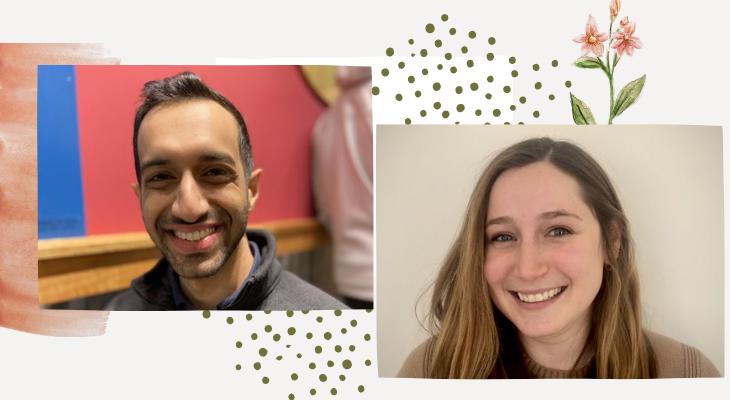A Better Conversation around Mental Health
April 28, 2021

It is probably clear what we mean when we refer to conversations around mental health, but what does it mean to make them better? As faith leaders, we can often feel lost in how to navigate such conversations. Are better conversations around mental health more comfortable, more efficient, more enlightening? Do they focus on resolving an issue, improving an outlook, or making light of some personal heaviness? As mental health clinicians and members of faith communities (one of us is Jewish and one of is Hindu), we believe strongly in the importance of better conversations around mental health as a way to foster connection and encourage open communication.
For example, earlier this year, the Islamic Center at NYU has hosted events centered on self-care, burnout, and loneliness. The Center also maintains a staff psychologist position and partners with the NYU counseling center to meet the mental health needs of their community.
According to the Centers for Disease Control, depression rates more than doubled from December 2019 to December 2020, increasing from 11% to 42%. While vaccination rates and warmer weather are currently lending us ample opportunity for optimism and joy, we are not nearly out of the woods regarding the lasting effects of the COVID-19 pandemic on our nation’s mental health. A few weeks ago, at the recent Interfaith Youth Corps Alumni Convening, we asked participants to shout out the words that came to mind while thinking of the pandemic’s mental health effects. Their responses, while unsurprising, were sobering. Grief topped the list of suggestions, followed closely by burnout, anxiety, and loneliness. With these solemn topics top of mind, it’s as important as ever to ensure that the conversations we’re having around mental health with our friends, family, and broader communities point us in the direction of connection and open communication.
For just a moment, imagine a fellow member of your congregation comes to you and says, “It’s hard for me to say this, but I’ve been feeling particularly hopeless lately.” How you choose to respond—perhaps with encouragement, with an admonishment, with questions, with a reminder of the blessings your fellow congregant is failing to see—might communicate subtly how you see your friend’s decision to confide in you. As mental health providers, we sometimes characterize responses like these along the lines of “persuasion” or “relationship”. A persuasive response might sound something like, “but the sun is finally shining, you just got your vaccination, your parents are healthy, and the puppy you adopted finally stopped chewing everything in sight!”
Without explicitly saying so, this response aims to convince your friend to adopt a different outlook (e.g., “But look at all the things there are to feel hopeful about!”). Meanwhile, a response made in “relationship” is typically composed of reflections of feeling, clarifications, and, importantly, open-ended questions. Responses made in relationship center on the friend’s feelings, communicate acceptance and non-judgment of them and allow for connection and emotional processing. In contrast, responses made in persuasion can minimize their experience or communicate implicit mental health biases. While persuasive responses feel natural and can certainly be appropriate in some situations, relationship responses prioritize the connection and clear the way for open communication around heavy topics.
While prioritizing relationship is effective at the interpersonal level, communities of faith can help set the stage for better conversations around mental health in a number of ways.
Five things your faith community can do:
1. Encourage clergy to reference mental health in sermons and spiritual talks
2. Compile a list of mental health resources in the community to be made available to community members
3. Invite experts and community members with lived experiences to offer workshops to learn about mental health
4. Start mental health specific programs such as support groups for adults and youth
5. Provide staff with more advanced mental health care training
This list was inspired by National Alliance of Mental Illness (NAMI) who provides several community-level action items to help get the conversation started.
With the sharp increase in mental health needs, we hope that our faith communities can begin to embrace increased mental health supports. Such integration can provide profound healing for those with whom we journey.
Alexis Grant is a doctoral student studying clinical health psychology. Her project on spiritual and religious competencies for mental health practitioners, SPARC, was supported by a 2019 Interfaith Innovation Fellowship.
Shivam Gosai is currently a mental health clinician in the greater Boston area and is interested in exploring the integration of religion/spirituality and counseling. Shivam has a B.A. in International Affairs from George Washington University (’13) and an M.S. in Community Mental Health Counseling from Villanova University (’20). Prior to entering counseling, Shivam pursued his passion for spirituality and Hindu philosophy through intensive study at the renowned Arsha Vidya Gurukulam in South India (’14-’17).
Share
Related Articles
American Civic Life
American Civic Life
Interfaith Inspiration



